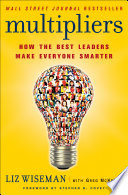

In 'Multipliers: How the Best Leaders Make Everyone Smarter,' Liz Wiseman presents a compelling framework for understanding how effective leadership can significantly impact team performance and organizational success. T...
Continue readingIn the book, Liz Wiseman introduces the concept of the 'Multiplier Effect,' which refers to how certain leaders amplify the intelligence and capabilities of their team members. Multipliers are leaders who inspire and cha...
Continue readingWiseman identifies five key disciplines that characterize Multiplier leaders: Talent Magnet, Liberator, Challenger, Debate Maker, and Investor. Each discipline represents a different way in which leaders can cultivate in...
Continue readingA significant theme in 'Multipliers' is the power of asking questions rather than providing answers. Wiseman argues that effective leaders engage their teams by posing thought-provoking questions that stimulate critical ...
Continue readingMultipliers cultivate a culture of continuous learning and growth within their organizations. They encourage experimentation and view failures as opportunities for learning rather than setbacks. This culture of learning ...
Continue readingFeedback is a critical component of the Multiplier approach. Wiseman emphasizes the importance of providing constructive feedback that focuses on growth and improvement. Multipliers create a feedback-rich environment whe...
Continue readingThe book explores how different leadership styles can significantly impact team performance. Wiseman contrasts the behaviors of Multipliers and Diminishers, illustrating how the latter can hinder team effectiveness. Dimi...
Continue readingStrategic delegation is another key concept in 'Multipliers.' Wiseman asserts that effective leaders delegate not just tasks but also decision-making authority. By empowering team members to take ownership of their work,...
Continue readingThe reading time for Multipliers depends on the reader's pace. However, this concise book summary covers the 7 key ideas from Multipliers, allowing you to quickly understand the main concepts, insights, and practical applications in around 22 min.
Multipliers is definitely worth reading. The book covers essential topics including The Multiplier Effect, The Five Disciplines of Multipliers, The Importance of Asking Questions, providing practical insights and actionable advice. Whether you read the full book or our concise summary, Multipliers delivers valuable knowledge that can help you improve your understanding and apply these concepts in your personal or professional life.
Multipliers was written by Greg McKeown, Liz Wiseman.
If you enjoyed Multipliers by Greg McKeown, Liz Wiseman and want to explore similar topics or deepen your understanding, we highly recommend these related book summaries:
These books cover related themes, complementary concepts, and will help you build upon the knowledge gained from Multipliers. Each of these summaries provides concise insights that can further enhance your understanding and practical application of the ideas presented in Multipliers.